Artist: Toby Jepson
Date: 26th June 2002
Interviewer: Glenn Milligan, BA Hons CS (via phone)
Find out what he has to say about being back on the road, releasing new material, The Little Angels and much much more.
(All photo's taken at Rock City, Nottingham, 27th July, 2002)
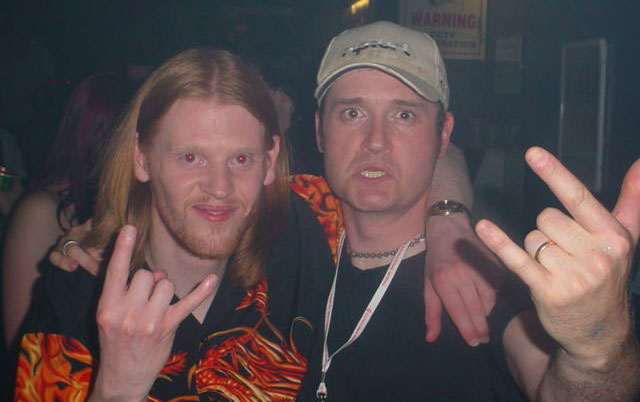
Glenn and Toby
Toby: Hi, is that Glenn.
Glenn: Yeah.
Toby: How are you?
Glenn: I'm fine. How did the gigs go on the first tour in March?
T: Well, just in terms of reaction and the very fact that I'm back in the club was astounding - it really was. Overwhelming really because I've been away for seven years. If you've not been active for 7 years, for anybody - no matter who it is - and god knows, I'm not the biggest artist in the world and I never expected people to sort of flood out of the woodwork and all the rest of it - but it was still very, very encouraging, extremely gratifying that people still regard me and the history of what I did and the music I was involved in is something that they wanted to re-acquaint themselves with. So that was great - I fully expected going out there and playing to empty halls and it was far from that.
G: Excellent.
T: It was absolutely astounding - the level of reaction via the website and via the things people were writing to me and the reaction to the (Re-fresh) E.P.
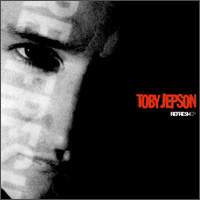
All the things it's just been great and from a standing start, after 7 years to where we are now, I couldn't be more pleased and the tour definitely I suppose defined my reasoning of behind wanting to do this again and taking it back out there again. It has totally re-invigorated me as an artist and as a performer - so yeah, great.
G: I mean, after you disappeared from the rock limelight - there was like a gaping big hole in the vocal department.
T: How very kind of you to say so.
G: You've got such an incredible voice - a few of my mates went to see 'The Little Angels' in the early 90's and said how tight the band was and how powerful your voice was - you had the loudest vocals out there. (Toby laughs). Like when you really go for the scream and you've got the brass section, it really pierces your ears. (Toby again laughs). You've got such a powerful voice.
T: I mean, the thing is, my wife is always telling me to keep my voice down. I think I've just been blessed with a certain degree with a loud voice. I think it's always something that's kinda been there - I think it's what drew me to singing - it brings out my favourite vocalists. My favourite vocalists specifically, I don't actually mean singers. I think there's a difference and I think the greatest vocalists of all time were always kind of big voiced, loud personality people that obviously fully enjoyed every second that they were doing there thing. That was always something that attracted me to people like Freddie Mercury, Robert Plant, even like Tom Yorke even if I'm not that keen of the way that Radiohead portray themselves, there's something kind of attractive to it - the kind of commitment to it that boy has to his art. I think that is the kind of thing that attracts me to singers and always made me want to perform and I don't think I'll ever feel any different, no matter how much the fashions come and go I don't think there's anything more committed than that.
What I get sick of is the pretenders - people that sort of stare at their shoes and don't have any stage presence at all and it's all just a bit of an act and a little bit foe.
G: The grunge thing in your flannel shirt, staring at your shoes !!
T: Yeah and to me that's not like an emotional act.
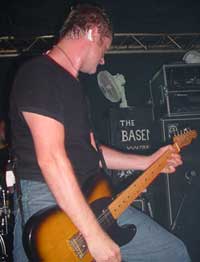
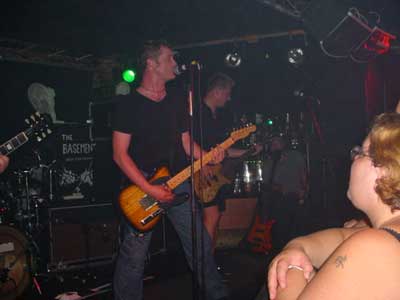
G: No it's not. it's not a performance - it's like how many songs have I got on the set list - then thanks and walk off (laughing)
T: Yes and unfortunately it occupies quite a high position in the music business - that kind of attitude and it's and shame because I think that - well I'm not saying it all has to be very Vaudeville, kind of David Lee Roth - that's a little over the top, but what I'm saying is, is that you can be, I mean John Lennon is my greatest hero because he did exactly what I'm talking about. He was committed to his art but he never compromised it. There was never any having to explain what he was doing -he just did it. I think that there's an awful lot of kinda like posturing and sort of like hidden agenda. People today kind of confuse it today with a kind of fashion statement.
G: I know, thank god that a lot of the great artists of the 80's and 90's are actually back and hitting the crowds and getting the people in (the venues). It's good to see.
T: I mean, there's no wonder that people, even in my small way - I mean, we've got a long way to go - I've got a long way to go with it. It's a kind of unknown quantity of how this progresses at the moment because obviously we are under the double duress of sort of financing my own label and trying to make sure everything works from a financial point of view as well as a performance point of view - something I've never had to face before.
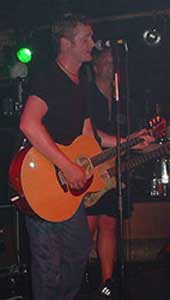
Equally exciting and invigorating as it is frustrating because I went through the 'Little Angels' period as part of a major label and never had to suffer the problem of financing the band because it was always there - so this is an entirely different set of circumstances and it's actually far more rewarding to stand out in front of 300 people at Rock City, Nottingham after 7 years and those people still be singing those songs, still wanting to buy the stuff, still wanting to be committed to the ideal of what the 'Angels set out to do - which was to entertain - pure and simple.
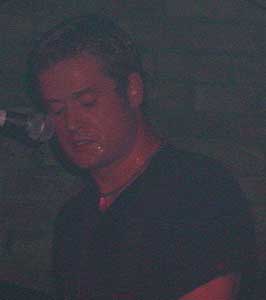
That's all we've ever wanted to do, to entertain people and that's the kind of thing I've grasped about this project is that I'd forgotten largely by the end of 'The Little Angels' because of circumstances and also because of personal emotional issues and things and what it was to actually entertain someone and going back to this project, that's what I wanted to do. To grab the best bits of what the 'Angels did and re-invigorate it with a kind of older eyes, older head on my shoulders sort of thing and kind of look at it - and go OK, well we can do this again - Ok, it's six years down the line but it doesn't make it any less credible.
The fact of the matter is, is that I think there is a big deficit of this kind of thing and every single person I've spoke to on the road were like, 'thank you for coming and doing this". It wasn't because they were like hero worshipping or anything like that - it was more to do with the fact that I think there's a generation of people - by contempories, that are I think left in the wilderness at the moment and largely forgotten by the music industry. They are not catered for. It's that whole thing, like where it takes a magazine like 'Classic Rock' to cater for people of our age group if you like - people who don't give a toss about fashion, don't care that 'The Libertines' are on the front of the NME and what they stand for - we don't care.
G: Exactly. I mean I've just come back from America and the Radio Stations there are incredible.
T: Yeah, they're unbelievable.
G: And when I get back here it's like 'sh*t' so I now long on to US Classic Rock stations so I'm not lost without it. I just wish this country would do a bit more.
T: The trouble is you see, I can comfortably talk about this with some authority because it's what happened to the 'Angels. The system in this county (United Kingdom) is not geared up to be able to deal with catering for everybody. It's absolutely marginalized. The fashions of music come and go and it's all about the quick fix and the quick delivery. There was a period of time which 'The Little Angels' rode the wave of in the late 80's/early 90's where there was so much money around in the record industry because of the changeover from vinyl to CD primarily and the re-selling of old rope, if you like via the back catalogue. It provided an opportunity for record labels to actually properly develop things with serious money.
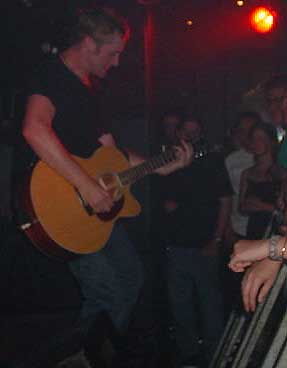
The Little Angels were very fortunate because we were one of those bands that were able to do that. The outcome of all that was that a lot of bands got signed and a lot of money was spent on these bands in the hope that if you chuck enough money at it then some of it will stick. It kind of left sort of the same old, same old way where you've got one or two bands that kind of broke through - I would hold the 'Angels' in that. We did actually break through and we did actually get into the charts, tour with some big bands and achieve a number 1 album etc, etc. But for every one, there were 20 or 30 bands that were signed to various labels that completely fell away. They probably weren't good enough, quite honestly.
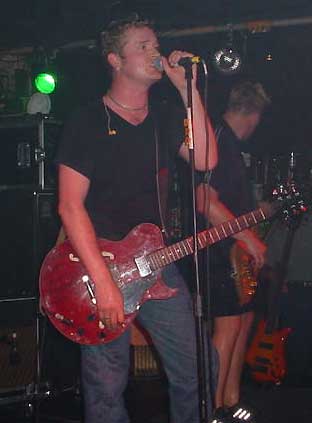
So the system just isn't geared up anymore because of the nature of that whole period to warrant any of that kind of money. I talk to people all the time, trying to talk to labels about this - not that I'm that concerned about trying to get a major record deal because I am not because I think there's lots of ways of actually doing this and I'm really happy with the way that the internet is dealing with my business now. It's freedom, but there just is not the commitment to bands anymore in this country because of the way that the music industry is. It's basically shot itself in the foot and hence, you get people like me still faced with either the prospects of either completely calling it a day or saying 'no, sod 'em, I'm gonna have a go, I'm gonna do it on my own terms'. You know, you get small things like my label, my company and my internet based thing springing up and actually doing good business and actually becoming a platform that completely circumvents the problem and the record industry doesn't like that at all. It hates it because they can't control it.

G: That's it. They can't do anything with it - it just does what it wants.
T: You know, there's so many people said to me, 'Oh you're mad going out in clubs, you'll never sell 'em out' and Andy Copping who runs Rock City said to me - we were about halfway through this tour in March and he'd been helping me with management, well not management but he's been advising me and my company as to how sort of promote what I'm doing and the marketing of it because he's a marketing expert.
He said,
"How you doing, how are the tickets going?"
and I said,
"Well, you know - we played Ipswich and got 300 in a 500 capacity venue."
He said,
"There are bands signed to major labels that are on the front cover of the NME that would kill for 300 people in a venue - that's what you've got to remember"
and he said,
"it's because your grabbing the bull by the horns and you're making what exists for you, work for you",
and that to me kind of completely underlined the reality of the situation in that there are people out there like you and me - people that wanna listen to my music and buy into what I am doing that are starved of the stuff and you can't just carry on selling something to teenagers constantly because there is only so much money, there's only so much time that these kids can actually dedicate there time to and they flip from one thing to the next anyway because that's the way of fashion.
I think there is just an opportunity here for me and whoever else who wants to get out there but are a bit older and a bit wiser and a bit of time to generate some music that means something to them. There's an opportunity for these bands to grab this audience and say, 'We'll do this and make you feel good about this again - come to our gigs - it's gonna be great fun and it's not about being older or being convinced that you are too old for the job - come and have some fun, remember what it was like and buy into it again.
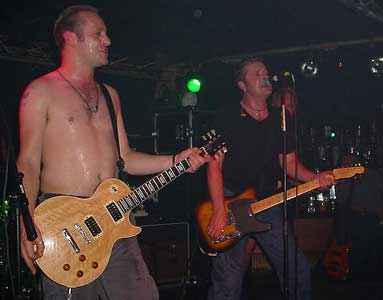
Nick Dunne and Toby Jepson
G: You've got Ricky Warwicke as well from 'The Almighty'. Is he in like a similar situation as yourself?
T: Yeah - he's got a very similar situation. He's got a small publishing deal. He's very fortunate that he's best mates with Joe Elliott from Def Leppard.
I think their audience (Def Leppard's) was just there and it's interesting because Ricky was sort of talking about the process that he was going through with Joe Elliott and the fact that he's making an album with Joe Elliott producing it.
I think it's going to be released in a very similar way to me or they are going to get a small distribution deal or something. It's interesting to know the way that Joe Elliott thinks about things because he was saying to Ricky how they have their dyed in the wool audience and they can always go to America and play sheds.
G: And come back here and...
T: Do nothing. He was saying it was like that well before 'Hysteria' with 'Pyromania' period. I mean, I remember it myself, going to Rock clubs in the early years - it was kind of like you were really in the know if you were into Leppard - you really knew what you were talking about because this great band had gone off and made it in America and on the way back and I think they are a kind of strange animal that band.
I'm looking forward to Ricky on the tour because he actually opened for me in London, last tour. It's really interesting what he's doing - a kind of punk acoustic thing. It's quite strange and it's not what people would expect from him but the great thing about it is that it absolutely lends itself to his persona in the way that he occupies a lot of stage - he's a big lad. He's kinda muscular and he's got that presence. You juxtapose that with him and an acoustic guitar and it works, somehow it works. He's covered in tattoo's, he's got a baldhead - he doesn't have long hair anymore. He stands up there and he sings these very heart-rendering sort of wilty ballads crossed with punk crossed with angry young man and it really does work. It's emotional and I really think that people will be really quite surprised what he's doing.
G: Awesome. Let me take it right, right back. What was it like growing up in Scarborough as a Rock fan?
T: My recollection of it was that it was pretty cool actually. The nice thing about Scarborough is that with me being brought up in a small seaside town was the power that it gave me, (that includes the power of being) in a band and I think also if you were into Rock at the time - it was the fact that it's very relaxing up here and no enormous pressure to be anything. It's kind of unpopulated enough to allow everyone to exist in the same space of time.
You can be a Rock fan and go to a place we used to have called 'Victorias' night-club or 'The Penthouse', which was a really famous Rock 'n' Roll club. I mean, literally every band that you could possibly name played at 'The Penthouse' like 'The Eagles', AC/DC, everyone you wanna think of - Whitesnake, you know, unbelievable and they all went through Scarborough and it's very famous in the music industry for being one of the clubs in the country that every band wanted to play.
I can understand why because of the things I'm describing to you. It's a really nice town to play and grow up as a musician in - hence there's lots and lots of musicians in this town and you were always supported by lots of other guys in this town wanting to play to people and wanting to be in bands, and because it's small, everyone knew everyone else in the same situation.
I was amazed when I first went to London and we went to 'The Marquee Club' and we were propping up the bar like everyone else and the amount of people that were all in bands and were all wanting to be famous and successful Rock 'n' Roll stars but none of them knew each other.
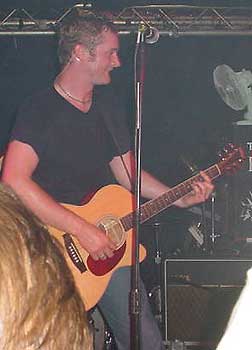
G: Because it's such a big place?
T: Yeah, because London is so massive and there's no support really at all. It's too much about competition and not enough about support.
G: A few years ago I met a guitarist in this band 'Snowblind', called Nigel who said you all used to lend each other equipment and such like.
T: Christ. Well, it's very, very likely, I mean he obviously must have come from Scarborough in that case or York or somewhere. Yeah, that used to go on quite a lot, you know. There was a limit to what people could afford - it's all the same old things you know, "Can I borrow your amp and all that?".
G: When you first started, did you ever have to play a lot of covers or did you get round to playing your own material quite a lot?
T: to be honest with you, it's embarrassing; I've never played covers. I say embarrassing because when I sit round at parties or go to someone's with a guitar and they'll say, (enthusiastic voice) "Come On - let's play some stuff" and I don't know anything (laughing) and I don't. I know one or two Beatles songs.
I've always played original material. I mean, the only time I ever played covers or we (The Little Angels) ever played covers because I was in several bands in Scarborough before I actually met up with the other guys was if we got a gig in town somewhere locally, we just used to throw 2 or 3 in just for the sake of it, but the majority of the set was always original material and nobody ever complained about that which is really interesting.
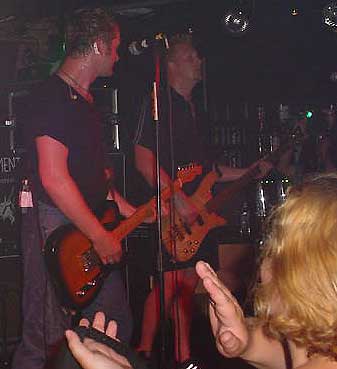
I think again, that something specific to Scarborough. You could go and play what was the equivalent to 'The Penthouse' which was called 'The Stage Door' at the time which was a really musical club, a really musical place and it was a contemporary place. You could go and play original music and no-one would complain about that, whereas now, for instance, there's been a change in that if you go and play anywhere in Scarborough - the whole covers band, the whole tribute band thing is just absolutely in full swing and you can't step into a local pub without seeing someone dressed up as somebody else playing their music.
G: Yeah, there's so many at it good or bad that draws people just because of the name.
T: There's a place in Scarborough that I play or warm up in called 'Murrays' and that is specifically a tribute band venue and I know the guy who runs it really, really well who says,
"When I have contemporary or original material in here, the place is dead - I put on a U2 covers band it's packed".
Because it's obvious isn't it -people just think, "well, I can't afford to go and see the real thing and because often the real thing ain't there anymore, so I'll go down the pub and get p*ssed and sort of sing along to the songs I know" and I can understand the context of it.
What I think is a bit of a shame is what started out as quite actually an interesting idea with things like 'The Australian Doors' and the 'ABBA' tribute band where it was kind of more cabaret based - it was almost more of an emulation - not a tribute, but more accounts to be a stage show and it was also on a big scale. Now it's just like the idea that any bunch of tossers can put a wig on and just pretend to be someone.
G: Out of interest, what would you say have been your favourite tours with 'The Little Angels'?
T: Well, 'The 'Angels' period, I'd probably out of all the tours we'd done. Opening for anyone, I'd say Van Halen or the Bon Jovi tour because the Bon Jovi Tour was Stadiums across Europe at a time when Bon Jovi were the biggest thing in Europe and we just happened to be going along for the ride which was quite simply staggering to take part in no less than 45-60,000 people every single day - one of the enormous stadium sort of tours - so that was something else and I also became good friends with Jon and before the point I became friends with him I kind of regarded him like everyone else did. What I realised about Jon and also the guys out of Van Halen and also Bryan Adams whose just a totally normal guy and thinks the same about music as I do.
Once you strip it down to the bare bones they are just good people and just happen to be a bit more successful and a bit luckier than everyone else and they realised that. That's the great thing that I found out about Jon and Bryan Adams is that they were very, very humble people - very, 'I can't believe we're here' type people and that was really, really, very, very sobering that I thought was extremely impressive. That, in itself, to actually take part and just be around these guys.
Again, the Bryan Adams tour was astounding and was a big stadium tour in the early 90's when he played 'Wembley Stadium' - so that was awesome. I think those three tours were the best tours we ever opened for that I had the most enjoyment on and it was a point where the band were in. Our band was successful as well.
But I think my favourite out of everything we ever did, I think my favourite period, period, of the band for just pure adrenaline and purely being part of a Rock 'n' Roll band that really were Rock Stars was the period of the 'Jam' touring - jammed every night, jammed on demand. I t was something else I'd never ever, I'll never forget it - it was just a stunning, stunning thing to take part in and it was everything I had ever dreamed about. Enough said. We played the big places, the big tours, the tour buses and everything. Everything you ever dreamed of as a kid when you pick up a guitar - we were that - we were in full-flight. It really was absolutely stunning - it really was incredible. I mean, we were jumping in and out of that onto other people's tours like Van Halen and Bon Jovi and also with our own shows and it really was incredible.
G: You toured with Yngwie Malmsteen in 1988, which is listed on the back of the sleeve. What was he like to work with?
T: Very, Very difficult at the time….
G: We interviewed him in Miami in April 2002 and he was so friendly, pleased to meet us, gave us drink, some cd's and he signed them as well.
T: I'm really glad to hear that. I remember his sound-checking one time and that 15 minutes was probably some of the greatest musical stuff I've ever seen. We were all like completely, absolutely blown away. It really was an amazing moment to witness - this sort of really, seriously talented guy blowing off steam.
G: Anyway, back to you guys - what would you say are your favourite things that you like singing from your new material or 'The Little Angels' period?
T: Tough question because I like to sing them all. That might sound like a really easy answer but it's true. I mean, I've never been one to sort of prefer a certain song. I love singing and that's what I actually convey in my performance.
You can out one night on a stage and a song can be really mediocre because you are not on top form or whatever or something in the day, for me, has affected my opinion towards that song from an emotional point of view. There's lot of things. I used to think about being an artist.
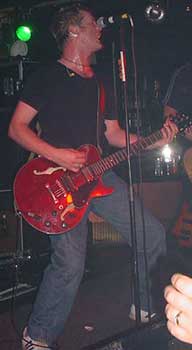
It's not cut and dried in that I think if you are pushed, I think every artist will say they love their new material but at the moment I'm really enjoying doing the new material because it's just a breath of fresh air. To think I can stand up and really… I think I shocked a couple of people that I could come out with an ep that has got some out and out rock tracks. I wanted to re-establish the fact that I am a rocker.
No matter what anyone says about me, you know I don't care. It's what I know about myself is that I wanna stand on a stage with a guitar and sing my b*ll*cks off and that's what matters to me. It kind of almost like the acceptance of that has given me the strength to do it. It's like, 'well OK, you might not stand in front of 2 or 3 thousand people ever again' - well I might do, I might not but if I stand in front of 300 people I'm gonna do this.
I mean the new stuff is great especially the first 3 tracks on the album, I absolutely love singing those tracks. I always love singing 'Don't prey for me' because I think that was probably the first breakthrough I had as a songwriter.
G: Excellent. What was the response to you when you came back with short hair?
T: No-one's ever mentioned it.
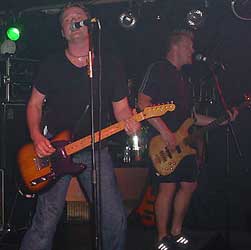
G: Well that's good because at the end of the day, the music comes first.
T: Well that's it. To be brutally frank with you, I always, even when I was in my mid-20's when I sort of the tousled hair look, I never intended to go beyond my 30th birthday with that kind of hairstyle. And in regard of how fashion's changed, I just thought and this is my personal opinion, I never wanted to be a 30-something with long hair. It was different for me to a certain extent because it was a trademark of mine to have that hairstyle. It was like, you know, in the public eye and as a personality, a kind of figure, a figure in peoples lives, you know my hair became more important than it actually was. It meant different things, you know. It's not like I just thought, "I've got long hair", it actually became part of the whole selling aspect of the band, you know.
G: I suppose it was the hair thing and it became a marketing tool at the time.
T: Yeah exactly, and there was an awful lot of that in the 80's and if you remember Tyketto and anyone of those bloody bands, you saw these slow-motion shots of them moving their hair about. It was because the girls liked it and the guys liked it too. It was a very clever theology actually. The sort of whole thing was very, very well marketed but if you look back at it now and it's as crap as I don't know what - but it worked. It definitely worked and it's probably one of those few things at the time that set rock 'n' roll apart from other movements and what's happened now is that now we are all cross-pollinating and nobody really knows what anything is.
I mean, Oasis, as much as I'm not a particularly big fan of them - they are a guitar rock band - you put a different shirt on the guy, it's scary - it's still guitar music and I think that's true for a lot of bands, you know, Stereophonics, whatever.
G: When 'The Little Angels' finished as such, what made you decide to go into acting?
T: Basically, it was just an opportunity that was too good to pass on and it so happened to be my second love. I mean I have a passion for that like I have a passion for music. So I knew I never would be able to step into the film business at any great high level unless it was kind of on a musical point of view if you like but believe me, getting songs onto a film or writing music for films is 50 times more difficult than becoming a pop star - it's incredibly difficult - it's highly skilled and I thought well it won't be an easy option so if I can't do that then I'm gonna go on and just enjoy it.
So I went in as an extra on Gladiator and sort of on an open period of around 2 ½ to 3 years and I worked my way through the system and ended up strangely enough as the highest position you can be as a layman, as a stand-in as a technical operator of sorting equipment for the video systems. So I thought it was great because I was totally anonymous.
I never told anyone what my past was or what my history was and apart from being actually on 'The Band of Brothers', which was the last thing I did which was a film about a TV series. I worked on that and eventually someone found out 6 months into the job and spilt like wildfire across the whole thing. Then of course, it actually changed the atmosphere because there were people who were 'Little Angels' fans working on the crew. It became a case of how are you and what you doing now more actually doing their bloody jobs and to be honest with you it actually became a bit of a problem. I actually hated it.
It was like, 'I didn't want you to know that", I'm not doing that, you're not here to try and posture, it was to do something different. I felt that kind of like in that sort of respects convinced me that, you know, I kind of had my lot on and I could no longer be anonymous that way. The agencies knew my past work everywhere that I worked.
Well, I really must go now but I'll catch up you later.
G: Thank you Toby for your time and I'll see you later.
T: Great stuff.
G: Take care mate.
T: All right mate.
G: See ya.
T: See ya Glenn. Bye Bye.
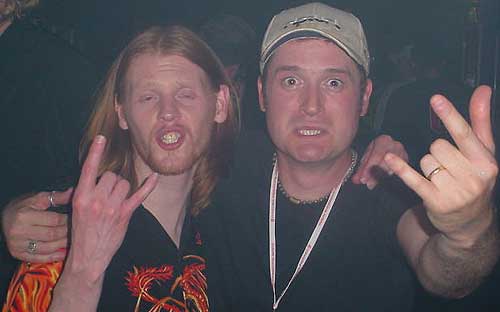
A rather scary shot of me pictured with Toby
A big thank-you to Louise @ Jepsongs for setting up the Interview and of course, Toby.